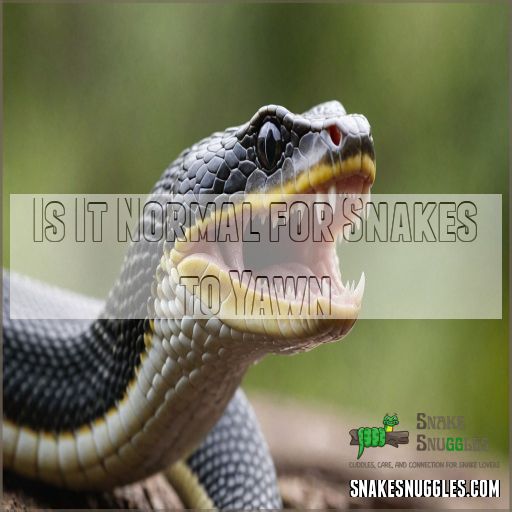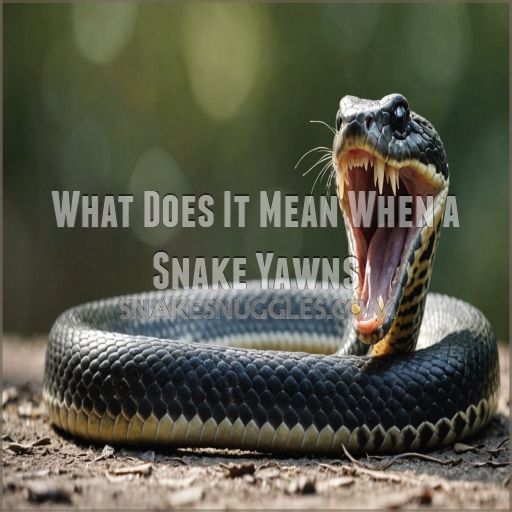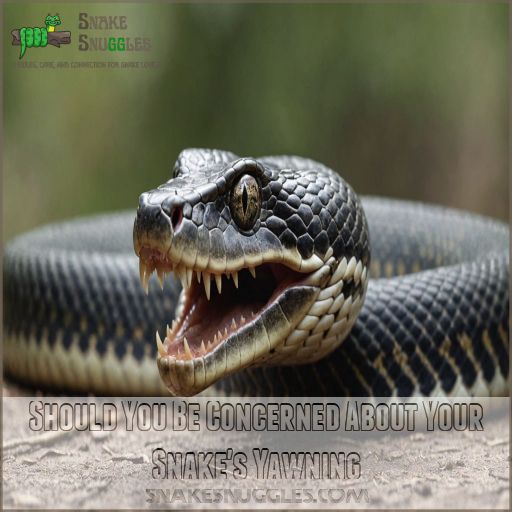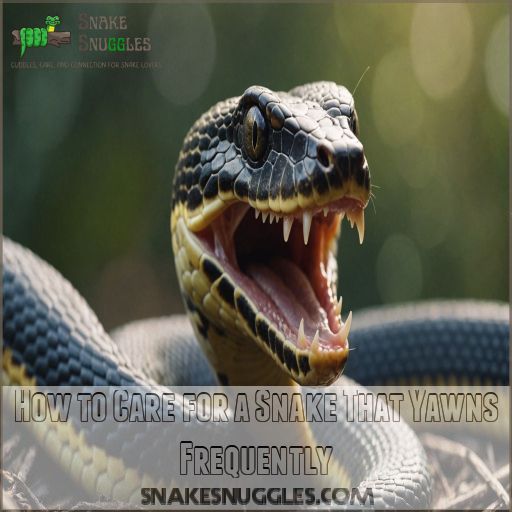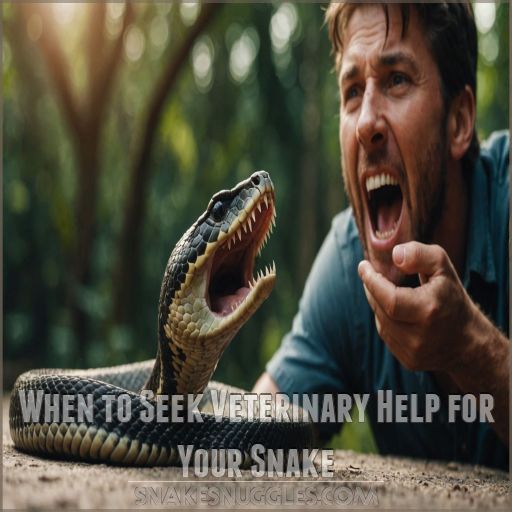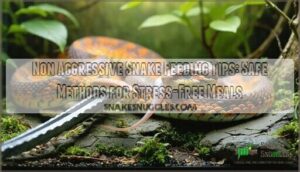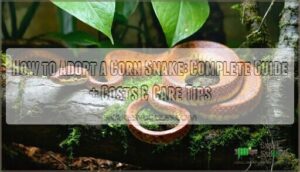This site is supported by our readers. We may earn a commission, at no cost to you, if you purchase through links.
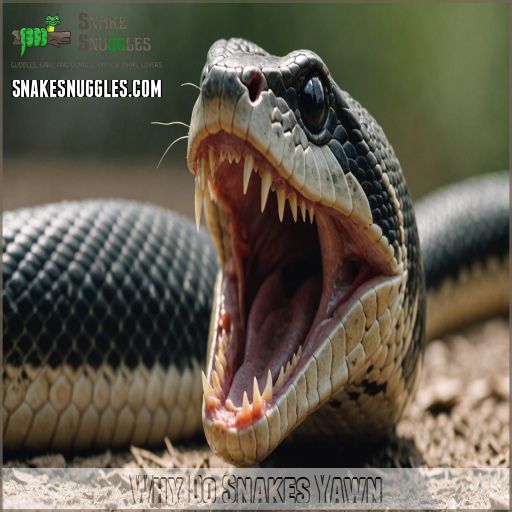 Ever wondered why snakes yawn? Well, it’s their quirky way of adjusting their jaws, kind of like how you stretch after a long nap. This jaw-stretching ritual keeps their mouths agile and helps them align everything after munching on a hefty meal.
Ever wondered why snakes yawn? Well, it’s their quirky way of adjusting their jaws, kind of like how you stretch after a long nap. This jaw-stretching ritual keeps their mouths agile and helps them align everything after munching on a hefty meal.
Yawning also regulates body temperature or clears the airways—imagine it as a snake-sized yawn-tastic multi-tool!
While yawning usually means they’re comfy, frequent yawning can hint at stress or health issues. So, if your scaly friend starts yawning like it’s going out of style, it might be time to play pet detective and figure out what’s up.
Curious? Stay tuned for more slithering secrets!
Table Of Contents
- Key Takeaways
- Why Do Snakes Yawn
- Reasons for Yawning in Snakes
- Is It Normal for Snakes to Yawn
- What Does It Mean When a Snake Yawns
- Should You Be Concerned About Your Snake’s Yawning
- How to Care for a Snake That Yawns Frequently
- When to Seek Veterinary Help for Your Snake
- Frequently Asked Questions (FAQs)
- Do snakes yawn when they’re tired?
- Why is my ball python yawning so much?
- What does it mean when snakes open their mouths?
- Why do snakes stretch their mouths?
- Do all snake species yawn equally?
- Is yawning contagious among snakes?
- Can yawning be a sign of aggression in snakes?
- Do snakes yawn more during certain times of the year?
- Is there a difference in yawning behavior between captive and wild snakes?
- Conclusion
Key Takeaways
- Snakes’ yawning might look like they’re cozily stretching after waking up, but it’s their way of keeping their jaw muscles limber and realigned, helping them get ready for their next meal. Imagine it as their unique version of morning yoga!
- Besides posing like they’re about to belt out a ballad, yawning helps snakes regulate their body temperature and clear their airways. This multitasking action ensures they’re as comfy as a snake sunbathing on a toasty rock.
- While occasional yawning is as normal for snakes as it is for you while binge-watching your favorite series, frequent yawning can be a signal of stress or underlying health issues. Keep an eye out, and consider playing detective if those yawns start feeling like an open invitation to the yawn-a-thon.
- Make sure to set up a proper environment for your slithery buddy. Ensure the temperature, humidity, and feeding practices are just right, helping keep their yawning to a normal level and their health in check. If your snake is acting like a tired teenager constantly yawning, a vet might just have the remedy.
Why Do Snakes Yawn
Have you ever noticed your snake yawning? Don’t worry – this natural behavior is quite common in snakes.
From stretching their jaws to regulating body temperature, there are several fascinating reasons why snakes yawn to prepare for swallowing prey.
Natural Behavior in Snakes
Let’s talk about snake yawning—a quirky yet natural behavior.
Snakes yawn for various reasons, often catching us off guard.
Here are three relatable insights:
- Jaw Adjustment: Just ate? Snakes might yawn to realign their jaws.
- Stretch It Out: Like flexing, yawning helps in snake stretching.
- Comfort Ritual: Yawning’s common in snake hibernation, shedding, or mating phases.
Theories and Explanations for Yawning
You might wonder why snakes yawn, but there’s no single answer! It could be jaw muscle relaxation or even a quirky way to regulate temperature.
| Theory | Purpose |
|---|---|
| Stress Relief | Alleviate tension |
| Sensory Input | React to environmental changes |
| Airway Cleansing | Clear mucus |
| Temperature Regulation | Maintain the right heat |
Yawning as a Sign of Relaxation
Shifting gears from theories, would you believe that yawning can also signify relaxation in snakes? Picture them in a cozy snake hammock after a long day. They’re not just aligning jaws or clearing airways but showing they’re comfortable.
Observing snake posture and yawning frequency helps differentiate stress from comfort, aiding reptile care and enhancing insight into animal health and behavior.
Yawning After Eating
After a hearty meal, your snake may let out a big yawn. This could be its way of realigning its jaw after the digestive process. Snakes often yawn more frequently after eating larger prey, as their jaws need to stretch to accommodate the food. Think of it as a post-feeding stretch to relieve any stomach pressure.
- Jaw realignment after eating
- Digestive process requires stretching
- Larger food size leads to more yawning
- Relieving stomach pressure after a meal
Reasons for Yawning in Snakes
Ever wondered why your snake yawns so much? Let’s explore how their yawning might be stretching their jaws, regulating body temperature, or just clearing their airways like a pro.
Stretching the Mouth and Jaws
Think of a snake’s yawn like your morning stretch — it’s all about flexibility! Snakes stretch their jaws to keep those jaw muscles in good shape.
This mouth movement makes sure their jaw structure is agile, ready to tackle any tasty meal.
Concerned about mouth health? Persistent stretching could signal issues like a fungal or bacterial infection, so stay observant!
Regulating Body Temperature
Five key reasons snakes yawn include regulating their body temperature. As cold-blooded animals, they yawn to:
- Adjust heat levels, like a living thermostat working overtime.
- Enhance their thermoregulation methods, reducing extremes.
- React to environmental impact, as comfortable temperatures are more than just “nice-to-have.”
Ever seen a snake basking? Their version of lounging in a hammock!
Clearing the Airways
Snakes may yawn to clear their airways and improve breathing.
This natural behavior helps them expel mucus or dislodge any obstructions.
If yawning is accompanied by other respiratory issues like mouth rot or gaping, it could signal an underlying infection.
See a vet to make sure your slithery friend’s airways stay clear and healthy.
Adjusting the Jaws
Let’s switch gears from airway clearing. Did you know snakes align their jaws after eating to make sure their jaw health is good? Here’s how you can spot it:
- Jaw alignment maintains their jaw function.
- Proper alignment supports overall jaw structure.
- Misaligned jaws lead to potential jaw problems.
So, if your snake appears to be a yoga enthusiast mid-yawn, it’s all about balance!
Is It Normal for Snakes to Yawn
Sure, snakes yawn, too, and it’s usually not a cause for alarm!
By watching how often your scaly friend yawns and learning about their unique habits, you’ll feel more connected to them than ever—as if they’re a sleepy cousin at a family reunion.
Frequency of Yawning in Snakes
Ever wondered why some snakes yawn more than others?
Maybe they’re just airing out their secrets!
Generally, yawning is a normal behavior, but variations exist across species and individuals.
Here’s a quick table for you:
| Yawning Rate | Possible Cause | Health Concerns |
|---|---|---|
| High | Stress | Monitor closely |
| Moderate | Relaxation | None |
| Low | Health Issues | Seek vet advice |
Yawning in Different Snake Species
Many snake species, from the mighty python to the slender garter snake, are known to yawn.
While some snakes may yawn more frequently than others, this natural behavior is generally considered normal and not a cause for concern.
Environmental factors and individual differences can influence a snake’s yawning habits, so it’s best to observe your scaly friend’s patterns closely.
Yawning in Ball Pythons
Ball pythons, with their calm demeanor, might yawn like an old friend settling into a comfy chair.
While yawning can seem odd, it’s often quite normal.
Sometimes it happens after feeding, aligning jaws for the next meal.
However, frequent yawns might signal stress or health issues.
Yawning in Other Popular Pet Snakes
Wondering if a corn snake yawning is normal? Absolutely! Like a ball python yawning or a boa constrictor adjusting post-dinner, it’s all part of their natural charm.
Even a king snake yawning takes a stretch.
Just keep an eye out—if your garter snake yawning seems excessive, reaching out for snake-savvy advice can keep your slithery buddy in top shape!
What Does It Mean When a Snake Yawns
When you see your snake yawning, it might be hungry, stressed, or just comfy like you on a lazy Sunday.
Understanding these cues helps you make sure your scaly friend thrives like the top reptilian lounge lizard it is!
Yawning as a Sign of Hunger
If your snake is yawning frequently, it could be a sign of hunger.
Snakes may yawn to stretch their jaws, clear their airways, or regulate their body temperature after a meal.
However, a lack of appetite accompanied by yawning may indicate an underlying health issue.
Pay close attention to your snake’s feeding habits, activity levels, and overall well-being.
Yawning as a Sign of Stress
Stress can make your scaly friend uncomfortable, causing them to yawn. Triggers in their environment might exacerbate the behavior. Consider possible stress factors for your snake:
| Triggers | Description | Solution |
|---|---|---|
| Temperature | Too hot or cold environments | Use a thermostat |
| Noise | Loud or constant disturbances | Relocate to a quieter space |
| Handling | Excessive or rough handling | Handle gently and minimally |
Ensure their habitat is soothing, and you’ll see fewer yawns.
Yawning as a Sign of Illness
Sometimes, a yawn can signal illness in snakes. Feeling under the weather, your pet might show more yawns than usual, coupled with symptoms like mucus and lethargy. It’s like your snakey friend’s way of saying, “Hey, I don’t feel so great!”
- Increased snake yawn frequency
- Nasal or oral mucus
- Snake lethargy
- Snake appetite loss
- Rapid breathing
Yawning as a Sign of Discomfort
While illness can be worrisome, yawning might point to discomfort too.
Picture your snake grumbling about pesky jaw pain or mouth sores, just like how we squirm with paper cuts.
Skin irritation and habitat woes could also trigger those gaping yawns.
Keep an eye on habitat issues like temperature and humidity—your snake’s way of saying, "Hey, let’s fix this!
Should You Be Concerned About Your Snake’s Yawning
As a snake owner, it’s important to pay close attention to your scaly friend’s yawning habits.
While yawning can be a normal behavior, frequent or excessive yawning may signal an underlying health issue that requires prompt veterinary attention.
Lookout for Signs of Illness
If you’re wondering about your snake’s well-being, keep an eye out for specific signs that might suggest something’s amiss in snake health.
Yawning frequently could mean:
- Mucus discharge from the nose or mouth.
- Appetite loss and refusal to eat.
- Lethargy, as if your snake’s stuck in slow-motion mode.
- Breathing problems, like they’re not getting enough air.
Better safe than sorry!
Monitor Your Snake’s Behavior
Keeping a close eye on your snake’s behavior is like catching a plot twist in a mystery novel.
Regularly watch for subtle changes in their health, appetite, or mood.
A sudden drop in enthusiasm for their favorite pinkie mouse or a shift to hiding more often than playing could be hints of something amiss.
Stay vigilant, and you’ll help your snake stay happy and healthy.
Consult a Veterinarian
Just like a detective needs a magnifying glass, a concerned snake owner needs a vet.
When your snake’s unusual behavior turns into a riddle wrapped in a mystery, it’s time to call in the pros.
Breathing difficulties, appetite issues, or skin problems? A vet can provide the expertise to make sure your slithery pal’s health isn’t going down a rabbit hole.
Analyze Your Snake’s Environment
Your snake’s environment plays a really important role in its overall health and behavior.
Make sure the temperature, humidity, and lighting are perfect for your snake’s species.
Check the enclosure size and substrate to provide a comfortable, stress-free home.
Making adjustments can help curb excessive yawning and keep your slithery friend happy and healthy.
How to Care for a Snake That Yawns Frequently
Caring for a snake that yawns frequently involves ensuring its environment is just right and keeping an eye on its health.
You wouldn’t want your slithery friend yawning from boredom or discomfort, so make sure it’s got a cozy setup, a balanced diet, and prompt care if anything seems amiss.
Providing a Proper Environment
Creating a cozy snake condo involves getting the right temperature and humidity.
Think of the enclosure as your snake’s little studio apartment, where substrate and lighting set the mood.
Make sure the temperature’s just right—not too hot, not too cold—like Goldilocks and her porridge.
A mist here, a lamp there, and voilá, your snake’s in paradise!
Feeding Your Snake
When feeding your snake, consider its diet like a fine-tuned symphony.
Make sure the prey size suits the snake, and keep the feeding frequency aligned with its species’ needs.
Although supplements may be unnecessary, they’re sometimes beneficial.
Choose frozen over live prey to protect your scaly maestro.
Avoiding Home Remedies
Resist the temptation to try home remedies – they could do more harm than good.
Your snake’s health is too precious to experiment with.
Instead, consult an experienced reptile veterinarian.
They’ll provide expert guidance specific to your snake’s unique needs, ensuring its well-being without risking unintended consequences.
Trust the professionals for the best care.
Seeking Veterinary Care
When in doubt, let a pro figure it out!
Frequent snake yawning might signal illness.
A vet visit is wise; they’ll explore treatment options and prevent costs from spiraling.
Snake parents, remember: your scaly friend’s health is worth it—better safe than sorry, right?
By ensuring this care, you’re the hero of your snake’s story.
When to Seek Veterinary Help for Your Snake
If your slithery friend keeps yawning like they’re in a boring movie, it might be time to check on them.
Spotting changes in appetite or behavior could mean it’s a good idea to give your local reptile vet a call.
Breathing Issues in Snakes
If your snake starts belting out a tune of wheezing sounds, it might be trying to tell you something’s wrong—like respiratory infections or lung problems.
Prioritize your snake’s safety by consulting a vet.
Your snake shouldn’t be breathless!
Relate to the trusty thermometer: signs like nasal discharge or constant mouth breathing are unwelcome flags.
Changes in Appetite or Behavior
If your snake’s appetite suddenly dwindles or its behavior shifts, don’t panic – these changes could signal an underlying issue.
Make sure its habitat is dialed in, as environmental factors like temperature and humidity heavily impact snake wellness.
Observe closely for signs of stress, like hiding or aggression, and consider reaching out to a vet if the changes persist.
Signs of Illness or Injury
Appetite loss and lethargy in snakes can sometimes feel as mysterious as a magician’s hat. You’re probably wondering when to call the vet. Look for:
- Mucus around your snake’s face
- Breathing difficulty like exaggerated yawning
- Skin changes or unusual marks
These signs flirt with danger, and your slithery friend’s health depends on swift action.
Preventing Health Issues in Snakes
Out of the blue, your snake might just be fussy about their digs! Help your snake stay healthy by setting up a proper habitat: keep everything cozy as a bug in a rug—stable temperatures, good humidity, and cleanliness are key.
Don’t let diet concerns snake up on you; occasionally, slither over to a reptile vet if symptoms slink around!
| Aspect | What’s Needed |
|---|---|
| Habitat Setup | Stable Temp, Good Humidity |
| Diet Concerns | Appropriate Diet |
| Parasites | Regular Checks |
| Reptile Vet | Visits as Needed |
Frequently Asked Questions (FAQs)
Do snakes yawn when they’re tired?
You’ve nailed it—snakes yawn even without the classic signs of being tuckered out.
While not exactly pulling an all-nighter, they might be realigning jaws or clearing airways.
Rather fascinating, like nature’s own yoga!
Why is my ball python yawning so much?
Did you know that up to 10% of snakes might yawn due to respiratory issues?
Your ball python’s frequent yawning could indicate jaw realignment post-eating or a respiratory infection.
A vet visit helps you feel confident (Source).
What does it mean when snakes open their mouths?
Snakes open their mouths for reasons like cooling down, which is like their version of fanning themselves, realigning jaws after dinner, or signaling distress.
Keep an eye out for ongoing issues to make sure they’re healthy (Source).
Why do snakes stretch their mouths?
Snakes stretch their mouths to realign their jaws after eating or simply to get comfortable.
It’s a natural behavior, not necessarily a sign of illness – just like when you yawn to relieve tension in your own jaw.
Do all snake species yawn equally?
Picture different snakes holding a jaw-alignment contest; some might yawn more than others.
Each species has its quirks, so you’ll find that not all snakes yawn equally.
Think of it as snakes’ unique personalities shining through!
Is yawning contagious among snakes?
Snake yawning isn’t contagious like it can be in humans.
Imagine trying to get a snake to yawn by yawning yourself—it’s about as effective as teaching a cat to fetch!
So, rest easy; it doesn’t spread.
Can yawning be a sign of aggression in snakes?
Imagine a snake’s yawn as a peace flag, not a battle cry.
While yawning may seem alarming, it’s not typically linked to aggression.
Instead, check for other stress signs like hissing or striking behavior.
Do snakes yawn more during certain times of the year?
You bet your scales, snakes do yawn more during certain seasons!
As the weather warms up in spring, their metabolism revs up, and they’ll stretch those jaws more to prepare for the mating and feeding frenzies ahead.
Is there a difference in yawning behavior between captive and wild snakes?
Just as city and country folk might show different quirks, captive snakes may yawn more due to environmental changes or stressors not present in the wild.
Each snake’s unique situation paints its own story, often differing widely.
Conclusion
While snakes may not need a dentist, their yawning offers fascinating insights into their behavior.
Wondering why snakes yawn? It’s not just for jaw-stretching after a hearty meal, it’s also about regulating body temperature and clearing airways.
So, the next time your slithery friend gapes like a sleepy teenager, you’ll know it’s more than just a quirky habit. Remember, frequent yawning might mean stress or health issues, so stay observant and consult a vet if needed.


